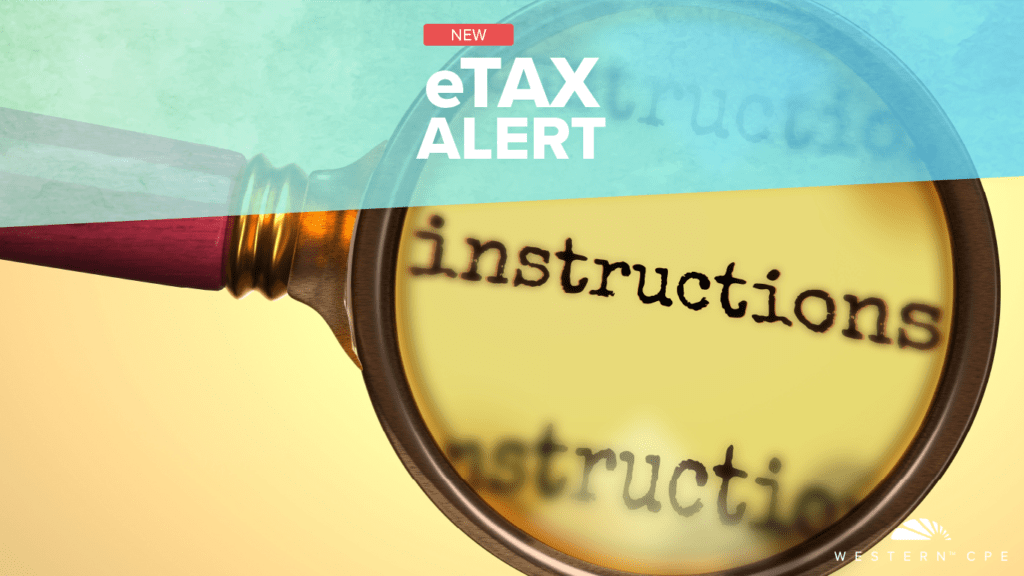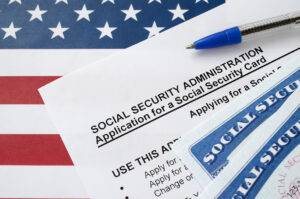

In case you thought you were all caught up on the IRS’s new Schedules K-2 and K-3 requirements, make sure you didn’t miss those revised December instructions that just dropped.
Say what?
That’s right, the IRS released the revised 2022 draft Partnership Instructions for Schedules K-2 and K-3 (Form 1065) and 2022 draft Partner’s Instructions for Schedule K-3 (Form 1065) on December 2. Likewise, it released the revised 2022 draft S Corporation Instructions for Schedules K-2 and K-3 (Form 1120-S) on December 5.
The revised drafts expand the domestic filing exception (DFE), which was introduced in the prior version of instructions released last October.
Key Changes
Before starting round two of our deep dive into the instructions, (last week was round one but “fuhgeddaboudit”) here’s the quick and dirty of some of the most notable revisions in December’s revised drafts:
- The January 15, 2023, partners notice requirement is no more. Now, notice can be issued by the date the Schedules K-1 are provided to the partners. But hang tight, it’s a little complicated as discussed below;
- The 1-month date is now a flexible date, defined as 1 month before the entity files the 2022 tax return; and
- The list of eligible partners is now expanded to include S corporations with a single shareholder and single member LLCs whose owner is listed as an eligible US citizen/resident alien partner.
Alright, if you want more get your goggles (or glasses), and let’s jump in.
Domestic Filing Exception Modified in New Draft Instructions
As noted above, the revised 2022 draft instructions modify the exception from filing Schedules K-2 and K-3 for partnerships and S corporations with little or no foreign activity. The DFE is available for partnerships and S corporations with $300 or less in foreign income tax, paid or accrued, which is reported on a U.S. information statement, 1099-INT, 1099-DIV, 1099-B, K-1, or other document.
New Expanded List of Eligible Partners and Shareholders
The latest draft instructions also now permit a partnership to use the DFE if there are S corporation partners with only one shareholder or SMLLC partners with the sole member a U.S. citizen or resident alien. Note: An entity with partners or shareholders which are partnerships or C corporations would not meet the Domestic Filing Exception.
New Ease of Timing of Partner and Shareholder Notifications
The requirement to issue written notices to all partners and shareholders has been substantially eased as follows:
- Valid partner or shareholder notifications may be made up to the due date for filing, including extensions, and
- Partner and shareholder notifications may be provided to the partners and shareholders as a statement included with their timely issued K-1s.
Revised 1-Month Date and Revised Requests Received Requirement
Under the December drafts, if the entity does not receive any notices requesting Schedule K-3 from partners or shareholders by the 1-month date, (previously February 15, 2023) then the partnership or S corporation is exempt from filing Schedule K-2 and Schedules K-3 for the 2022 tax year.
The 1-month date is now a flexible date, defined as 1 month before the entity files the 2022 tax return. So, for calendar year entities, the latest 1-month date deadline which would require Schedules K-2 and K-3 to be filed with the entity tax return would be August 15, 2023. If any notices requesting Schedule K-3 are received from a partner or shareholder by the new 1-month date (1 month before filing Form 1065 or Form 1120-S) then the entity is required to prepare and file Schedule K-2 for the entity and prepare, file, and issue Schedule K-3 only for the requesting partners or shareholders by the filing date of the tax return.
Burden Shift - Changes to Partner & Shareholder Notifications
The new 1-month before filing date, including extensions, puts the burden on partners, shareholders, and their tax practitioners to request Schedule K-3 if they want Schedule K-3 issued with Schedule K-1. Otherwise, if they wait until they receive the K-1 timely, as late as September 15, which may include the partner or shareholder notification, and then request Schedule K-3, they risk not getting the applicable K-3 until October 15, cutting it very close for the extended due date for filing Form 1040. Remember, it’s 1 month before the entity actually files the return, not 1 month before the due date of the return, including extensions.
The verbiage for the notification remains the same, mandating the notice must state that each partner or shareholder will not receive Schedule K-3 from the partnership or S corporation unless a partner or shareholder requests Schedule K-3 from the entity.
Penalties May Apply if Sole Shareholders or Married Partners Do Not Issue Notification
Notably, example 2 of the new draft instructions reminds us that the IRS intends to require partner and shareholder notifications even from S corporations with one shareholder and even from S corporations or partnerships whose sole owners are married spouses. There does not appear to be any relief from the notification requirement for very closely held entities where the only partners or shareholders are also the tax matter partners or shareholders. And if an entity does not meet the DFE then they’ll need written notice from the owners that they do not need Schedule K-3 due to the Form 1116 exemption.
Domestic Filing Exception is Relief from Filing, K-2 & K-3, Preparation May be Required
It’s important to note that the DFE is only relief from filing Schedules K-2 and K-3 with the federal tax return. It is not relief from the obligation to prepare Schedules K-2 and K-3 and then issue Schedule K-3 to any partners or shareholders who request Schedule K-3 after the 1-month date.
Form 1116 Exemption Exception Rules Also Change with New Instructions
Another exception to filing Schedules K-2 & K-3 which is available to partnerships and S corporations is the Form 1116 Exemption Exception. If the entity did not issue timely partner and shareholder notifications by the filing date of the entity, including extensions, or does not meet other criteria for the Domestic Filing Exception then Schedules K-2 & K-3 must be completed unless the entity has been notified that:
(a) the partnership or S corporation does not have a partner or shareholder that is eligible to claim a foreign tax credit or
(b) no partner or shareholder would have to file a Form 1116 or Form 1118 to claim the foreign tax credit.
A domestic partnership or S corporation is not required to complete and file Schedules K-2 & K-3 if all partners or shareholders are eligible for the Form 1116 exemption and the entity receives notification of the partners’ or shareholders’ eligibility for such exemption by the 1-month date, now defined as 1 month before the date the partnership or S corporation files the tax return.
Example: Partnership Notified All Partners Meet Form 1116 Exception
For tax year 2022, a calendar year partnership with more than $300 of foreign tax paid, therefore not meeting the Domestic Filing Exception, qualifies for the Form 1116 Exemption Exception if notified by all partners no later than 1 month before filing the return that they do not need Schedule K-3 under the individual Form 1116 exemption.
Note. Individuals may qualify for an exception to filing Form 1116 to claim the foreign tax credit reported on Form 1040, Schedule 3, if foreign tax paid is $600 or less for married filing jointly or $300 or less for other filing statuses. In which case taxpayers may enter foreign tax paid directly on Schedule 3, to claim the full credit for an amount up to $600 for married filing joint or $300 for all other filing statuses.
The New Draft Instructions Also Mandate Next Year 2023 K-2 & K-3 Obligations
The new December draft instructions indicate partnerships and S corporations will have a requirement to file the 2023 Schedules K-2 and K-3 and issue a 2023 Schedule K-3 to any partners or shareholders who request a 2022 Schedule K-3 this year.
Challenges with Implementing the New December Draft Instructions
As alluded to above, there may be some challenges in implementing the new draft instructions. For partnerships and S corporations the new instructions definitely remove the January 15 burden to issue all of the partner and S corporation notifications. However, this now shifts the burden to the partners and shareholders who need Schedule K-3 to request the form in time to receive it by the time the Schedule K1s are issued, just to eliminate the need to wait for Schedule K-3 after Schedule K-1 is received.
And now to use the Form 1116 Exemption Exception a proactive task is still required by the entity or the tax practitioner to prompt the partners or shareholders to notify the entity by the 1-month date that they do not need Schedule K-3 due to the individual Form 1116 Exemption.
So, the DFE seems easier for the entity but not the partners and shareholders who may need Schedule K-3, and the Form 1116 Exemption Exception still requires a notice to get the Form 1116 status from the partners or shareholders, because the Domestic Filing Exception notification deadline permitting an attachment to Schedule K-1 will not meet the Form 1116 Exemption Exception 1-month deadline.
And as before, if even one partner or shareholder needs Schedule K-3, then Schedule K-2 must be prepared, even if it isn’t required to be filed with the entity tax return.
Final Thoughts
Tax practitioners may still want to consider filing Schedules K-2 and K-3 with a few minimum entries to meet basic filing requirements for domestic entities with little or no foreign activity. This would eliminate the need to meet the compliance requirements for the available exceptions. If a domestic partnership or S corporation files Schedules K-2 and K-3 with basic minimum entries, they will not need to rely on the exceptions for compliance.
Recent Stories




Senate Finance Committee Revisions to OBBBA


California Corner: FTB Experiencing Technical Issues
Next Up...
- |
- TaxByte
- |
- TaxByte
